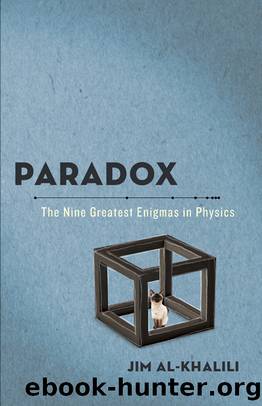Paradox: The Nine Greatest Enigmas in Physics by Jim al-Khalili

Author:Jim al-Khalili [al-Khalili, Jim]
Language: eng
Format: epub
Tags: General, Mathematics, Science, Games, Physics, Recreations & Games, Logic & Brain Teasers
ISBN: 9780307986801
Publisher: Broadway
Published: 2012-10-23T00:00:00+00:00
6
THE PARADOX OF THE TWINS
By traveling very fast we can move into the future.
In this chapter we continue with the theme of paradoxes arising from the predictions of Einsteinâs relativity theory. Here, however, we will be delving into the pleasingly mind-bending concepts associated with the nature of time itself and how it is affected by travel at close to the speed of light.
The story line of this paradox may sound like science fiction, but is in fact perfectly within the mainstream science taught to every physics student as an example of the implications of relativity, even if it is not technologically achievable just yet. It involves a spacecraft capable of reaching near light speedâwhich, while we have no means of developing such a craft at the moment, is nevertheless perfectly admissible in principle. And, because it doesnât exceed the speed of light, there is no need to appeal to the rather more speculative ideas one finds in popular science fiction such as warp drives or short cuts through hyperspace.
Meet our heroes, the twins Alice and Bob, who design and build this spacecraft. While Bob remains behind on earth, Alice pilots the spacecraft, flying it from the Earth on a round-trip through the galaxy that takes her exactly one year to complete. On her return to Earth she is biologically one year older, she feels that one year has gone by, and all the clocks and timekeeping devices on board the spacecraft agree that a single year has elapsed since she left the Earth.
Bob, meanwhile, has been monitoring her journey throughout, and he witnesses one of the weird effects that manifest themselves as a result of her traveling at near light speed, and is predicted by Einsteinâs theory of relativity: time on board the spacecraft appears to Bob to be running more slowly than it is on Earth. If he were to watch events inside the spacecraft through a camera he would see everything taking place in slow motion: clocks on board ticking more slowly, Alice moving and speaking more slowly, and so on. So a journey that seems to Alice on board the spacecraft to have taken just one year in fact lasts ten Earth years as far as Bob is concerned. Indeed, Alice arrives back on Earth to find that her twin has aged ten years, whereas she is biologically just one year older.
This in itself is not the source of the âparadoxâ of the chapter title. It may sound odd, but it is perfectly consistent with the predictions of Einsteinâs theory. The times I have chosen are arbitrary and depend on just how fast the spacecraft has been traveling. Had Alice, for instance, nudged even closer to the speed of light, then quite straightforward mathematics for anyone with a pocket calculator would show that one year on the rocket could correspond to a million years on Earth or, equivalently, during a dayâs travel by Aliceâs reckoning thousands of years would go by on Earth. But let us stick
Download
This site does not store any files on its server. We only index and link to content provided by other sites. Please contact the content providers to delete copyright contents if any and email us, we'll remove relevant links or contents immediately.
Tools of Titans by Timothy Ferriss(8370)
Turbulence by E. J. Noyes(8040)
Secrets of Antigravity Propulsion: Tesla, UFOs, and Classified Aerospace Technology by Ph.D. Paul A. Laviolette(5369)
Astrophysics for People in a Hurry by Neil DeGrasse Tyson(5184)
Room 212 by Kate Stewart(5105)
Design of Trajectory Optimization Approach for Space Maneuver Vehicle Skip Entry Problems by Runqi Chai & Al Savvaris & Antonios Tsourdos & Senchun Chai(5066)
Pale Blue Dot by Carl Sagan(4996)
The David Icke Guide to the Global Conspiracy (and how to end it) by David Icke(4709)
A Journey Through Divination and Astronomy by Publishing Pottermore(4382)
Goodbye Paradise(3802)
Apollo 8 by Jeffrey Kluger(3705)
COSMOS by Carl Sagan(3618)
The Five People You Meet in Heaven by Mitch Albom(3562)
Losing the Nobel Prize by Brian Keating(3534)
How to Read Water: Clues and Patterns from Puddles to the Sea (Natural Navigation) by Tristan Gooley(3466)
Brief Answers to the Big Questions by Stephen Hawking(3430)
How to Read Nature by Tristan Gooley(3335)
The Order of Time by Carlo Rovelli(3188)
A Brief History of Time by Stephen Hawking(3022)
